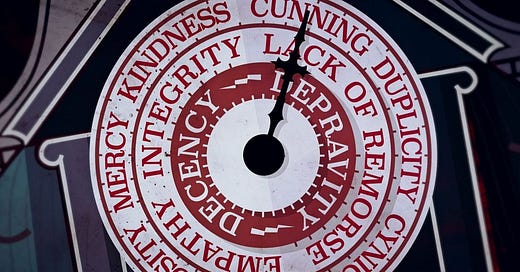Inconvenient Facts About "Dark Triad" Personality Traits
Broadening the good versus evil narrative
There is no shortage of Dark Triad personality trait references.
Adam Grant and Sharon McMahon wonder why people with Narcissism, Psychopathy, and Machiavellianism are overrepresented in government.
Scott Barry Kaufman asked in Scientific American - why are people elevated on the Dark Triad more seductive than virtuous humans?
Sift through the most popular articles on Psychology Today and you’ll regularly find an article on how to outsmart a narcissist, spot whether you’re dating a psychopath, and recover from being raised by one.
Key Features
For a primer on what separates these seemingly undesirable qualities, consider:
Narcissism. This designation is for people holding inflated beliefs about their importance along with a sense they deserve greater treatment than the minions around them (entitlement). A primary objective is to maintain a grandiose vision of one’s awesomeness.
Psychopathy. There are four parts to psychopathy spanning the social (superficial charm, grandiose self-worth, pathological deception, and manipulative), emotional (lack of remorse and empathy, shallow emotional reactions), criminal (criminal versatility and an early history of delinquency), and erratic lifestyle (impulsivity and a craving for highly risky stimulation ).
Machiavellianism. My favorite definition is “a duplicitous interpersonal style, a cynical disregard for morality, and a focus on self-interest and personal gain.” Individuals high in this trait view other people with suspicion and mere objects to manipulate.
Here’s a quick visual comparison with a bonus fourth dark trait:
I appreciate how psychologists are attempting to capture the concept of evil. And yet, it is useful to diverge from an overly simplistic storyline.
Trying to Influence People is Terrible
I gave a talk to The Psychotherapy Networker conference almost a decade ago, where I received the lowest evaluation of any speaker across multiple days.1 The reason? I spoke about the strategic use of manipulation to improve the mental health of clients.2 Therapists in the audience lost their shit. They could not understand how being inauthentic is ever acceptable. Audience members told me they behaved in a 100% authentic manner for every 50 minute therapy session.
FUN TIP: never trust someone who claims such certainty and absoluteness in their behavior across situations and time. Humans simply don’t have that level of self-awareness much less stability.
The word “manipulation” is a loaded term with connotations of unfairly taking advantage of another person (or acting unscrupulously). We think of con men or the psychic who bilks grandmother for thousands.3 The word manipulation means to influence; much in the way a teacher tells a funny story to keep students engaged, or a leader offers a self-deprecating comment to flatten the power hierarchy (at least temporarily). Or there’s the waitress suggesting you pass on the tater tots for the far more expensive pan-seared sea scallops drizzled with bacon bits, maple syrup, and Himalayan pink sea salt.
Everyday each of us takes part on both sides of influence attempts. Now if you lack power and status, the path for influencing people is quite different (known as “minority influence”).
Those who write and research the Dark Triad often limit the conversation to the extremes. The murderer in prison with no remorse. Enron executives. Pickup artists. Here is my single suggestion: Don’t excise the rest of the bell curve.
Trying to Influence People is Beautiful
One instance of “positive manipulation” is when non-profits solicit funds from donors. Daniel Feiler and colleagues explored different types of appeals used by charitable organizations. There is an egoistic appeal (where giving money helps people feel good) versus an altruistic appeal (where giving money helps people in dire situations). When presented with one of these two appeals, potential donors fork over cash 6.5% of the time. Presented with both appeals, however, that percentage was cut in half. It appears that people don’t mind being appealed to, but rely on too many strategies and the interaction feels dirty and unappealing. This study underscores an important element in the game of social influence: the words used and emotions evoked matter. Which is why public speakers often practice with coaches instead of speaking extemporaneously. Which is why physicians are best served by expressing empathy to a patient before asking for behavior change - even when they feel nothing of the sort.
Soft approaches are intended to “grease the wheels” of a social interaction through flattery, name-dropping, or reciprocity. These approaches are used commonly even for the most altruistic reasons. A school enlists the aid of a celebrity to drum up motivation for resisting drugs and moving on to higher education. People engaged in conflict resort to soft persuasive tactics to resolve differences, especially in the case of friendships or romances. Consider a boyfriend who consoles his partner by saying “that must be really hard for you.” The compassion often has the intended effect of lowering defensiveness, a move that aids the relationship. It also serves as a strategy to avoid knee-jerk impulses to offer advice. The compassion in this instance, while authentic, is also strategic.
There are at three categories of influence strategies:
Hard tactics, when you are aggressive in trying to get someone to comply with requests (often used by people in power positions)
Soft tactics, when you use friendliness and kindness to alter someone’s thinking or behavior
Rational tactics, when you guide people through logic and problem-solving.
The hard tactics dominate public discourse on the Dark Triad - this is what people high in narcissism, psychopathy, and Machiavellianism do. But they also engage in softer and rational tactics just like the rest of us. We are all manipulative some of the time.
We seek a desirable relationship outcome by putting in the effort into writing a letter of gratitude.
We hope to alter the feelings and thoughts of someone else by offering a gift.
We share a story about a personal failing or difficulty publicly as an act of self-presentation, or to alter the group’s motivation or solidarity.
Do not limit the psychological tools at your disposal because of unnecessary fears about being north of neutral on the Dark Triad.
Wear sufficient armor to notice what other people use as influence tactics and protect yourself as necessary.
Lead with good intentions, giving people ample opportunity to question, disagree, or refuse for good reasons.
Provocation
Resist the allure of labeling behaviors such as doing kind things for someone, flattery, intentionally putting someone in a good mood, helping someone feel positively about themselves as a bad thing: manipulation. View these behaviors for what they are - an attempt to be a responsive and helpful social interaction partner. Just as you seek advice and mentorship from those who know more than you on a topic, others want the same. When you possess information or a skill that you want to impart, how can you produce greater curiosity from audience members? Own your positive influence tactics with a desire to help others do their best and relish the journey.
The best way to support me is to spread the word & share this issue. And click the free ❤️ button. For more on optimizing your hidden strengths, read The Art of Insubordination: How to Dissent and Defy Effectively.
Additional Curiosities
Watch or listen to an interview with two of my favorite hosts as we discuss concrete strategies for navigating the emotional chaos that often arises during the holiday season. And you get to learn what situation makes me shy and socially anxious.
And If You Missed the Last Issue…..
To date, no Provoked issue has been read by more people in 24 hours than this one. Enjoy.
It happens. This is where motivational slogans come in handy. As the famous Teddy Roosevelt statement goes, be the man/woman who enters the arena and dares greatly. Then there is the Japanese proverb “Nana korobi ya oki” - “Fall down seven times, get up eight.” Just make sure to reflect on and integrate useful feedback before dusting off and jumping back into the arena.
Part of the “The Teddy Effect” chapter in the book Robert Biswas-Diener and I wrote, The Upside of Your Darkside. We detail the story and psychological science behind President Theodore Roosevelt and how his elevated narcissism and psychopathy are what made him great. He is not alone as this is the case for many of the greatest leaders around the world. Check out our discussion of this work on The School of Greatness with Lewis Howes.
Highly accurate statement about my maternal grandmother, and more recently, my Aunt Naomi and cousin Sara. I love you regardless. And I spend many hours shaking my head, wondering how they pull this off on you many, many times.









Thank you, Todd. This explains why I felt so invaded and frustrated with all the hundreds of emails and texts I received from political groups wanting constant contributions. It had the opposite effect. I contributed to one candidate and not three seconds later the same campaign wanted more money. It’s lessened somewhat now; however, it’s still happening and I still feel under attack. I wonder how many other people felt that way? Great piece!
Another great read—thanks Todd—I look forward to the next Provoked issue. :-)